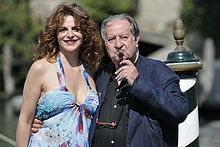- Tinto Brass
-
Tinto Brass 
Tinto Brass and Caterina Varzi at the 2009 Venice Film FestivalBorn Giovanni Brass
26 March 1933
Milan, ItalyOccupation Film director Years active 1963–today Spouse Carla Cipriani (until 2006) Website http://www.tintobrass.it/ Giovanni Brass (born 26 March 1933), better known as Tinto Brass, is an Italian filmmaker. He is noted especially for his work in the erotic genre, with films such as Così fan tutte (released under the English title All Ladies Do It), Paprika, Monella (Frivolous Lola) and Trasgredire. On Sunday, 18 April 2010, he suffered an intracranial hemorrhage.[1]
Contents
Life
His nickname Tintoretto (later shortened to Tinto) was given by his grandfather Italico Brass, a renowned Gorizian painter of Austrian (German) descent.[2][3] Throughout the 1960s and 1970s he created many avant-garde films, including Nerosubianco, L'urlo, and La Vacanza. However, he is best known for his erotic epics, Salon Kitty, The Key, Senso '45 and Caligula. The latter film was a collaboration with celebrated author Gore Vidal, Franco Rossellini and Penthouse magazine publisher Bob Guccione. However, many consider Caligula not to be a true Tinto Brass film since post-production was not handled by Brass. The director demanded that his name be stricken from the credits after Guccione inserted hardcore sex scenes and recut much of the film's story and theme structure. Despite this, the film contains many of Brass' trademarks and remains his most widely viewed work (and the highest-grossing Italian film released in the United States). Well into his seventies, he continued to make films.[4]
In 1972, he was a member of the jury at the 22nd Berlin International Film Festival.[5]
He is an atheist.[6]
Style
Brass' films follow an impressionistic style – they tend not to show immense landscapes, but bits and pieces of the scenery and peripheral characters and objects through pans and zooms, thus imitating how the viewer might see the events if they were actually present. This also gives the films an extraordinarily rapid pace. He often uses a television-like multicam method of shooting, with at least three cameras running at once, each focusing on something else.
There are many other directorial trademarks throughout his films. From 1976's Salon Kitty onwards, mirrors play a large part in the set design. Sometimes he even goes as far as to begin a scene with a mirror shot, then pan over to the action being reflected, giving a disorienting feeling. His erotic films – especially The Key, Miranda and All Ladies Do It – often accentuate women's buttocks and hairy armpits, almost to the point of fetishizing those particular physical features.
Brass' films in the 1980s and early 1990s had mainly been adaptations of famous erotic literary works, namely The Key (La chiave), The Mistress of the Inn (Miranda), the novel Le lettere da Capri by Mario Soldati (Capriccio), Fanny Hill (Paprika), and the novel L'uomo che guarda by Alberto Moravia (The Voyeur), while 2002 film Senso '45 is an adaptation of Senso, previously filmed by Luchino Visconti.
He almost always works in a cameo for his friend Osiride Pevarello and, in the recent years, himself as well.
Filmography
- In capo al mondo or Chi lavora è perduto (1963)
- Ça ira - Il fiume della rivolta (1964)
- La mia signora (1964)
- Il disco volante (1964)
- Yankee (1966)
- Col cuore in gola (1967)
- L'urlo (1968)
- Nerosubianco (1969)
- Dropout (1970)
- La vacanza (1971)
- Salon Kitty (1975)
- Caligula (1979)
- Action (1980)
- La Chiave (1983)
- Miranda (1985)
- Capriccio (1987)
- Snack Bar Budapest (1988)
- Paprika (1991)
- Così fan tutte (1992)
- The Voyeur (1994)
- Fermo posta Tinto Brass (1995)
- Monella (1997)
- Trasgredire (2000)
- Senso '45 (2002)
- Fallo! (aka Do It!) (2003)
- Monamour (2005)
- Chi ha ucciso Caligola? (preproduction)
References
- ^ "Cinema: Tinto Brass e' grave" (in Italian). ANSA. 18 April 2011. http://www.ansa.it/web/notizie/rubriche/cinema/2010/04/18/visualizza_new.html_1764270228.html. Retrieved 25 August 2011.
- ^ "Tinto Brass fan website - Italico Brass". Rjbuffalo.com. http://rjbuffalo.com/italico.html. Retrieved 2010-10-13.
- ^ ArteRicerca. "Arte ricerca - Italico Brass". Artericerca.it. http://www.artericerca.it/artisti_italiani_ottocento/b/brass%20italico/italico%20brass%20biografia.htm. Retrieved 2010-10-13.
- ^ Evolver, "First, I check out the butt" Brass interview on the occasion of his 75th birthday, May 2008
- ^ "Berlinale 1972: Juries". berlinale.de. http://www.berlinale.de/en/archiv/jahresarchive/1972/04_jury_1972/04_Jury_1972.html. Retrieved 2010-03-15.
- ^ Il Giornale, "I miei film andrebbero proiettati nelle scuole"
External links
Films directed by Tinto Brass 1960s In capo al mondo or Chi lavora è perduto (1963) • Ça ira - Il fiume della rivolta (1964) • La mia signora (1964) • Il disco volante (1964) • Yankee (1966) • Col cuore in gola (1967) • L'urlo aka The Howl (1968) • Nerosubianco (1969)1970s 1980s Action (1980) • La Chiave (1983) • Miranda (1985) • Capriccio (1987) • Snack Bar Budapest (1988)1990s Paprika (1991) • Così fan tutte (1992) • L'uomo che guarda (1994) • Fermo posta Tinto Brass (1995) • Monella (1997)2000s 2010s Chi ha ucciso Caligola? (preproduction)Categories:- 1933 births
- Living people
- People from Milan
- Italian film directors
- Italian film editors
- Italian people of Austrian descent
- Italian atheists
Wikimedia Foundation. 2010.
